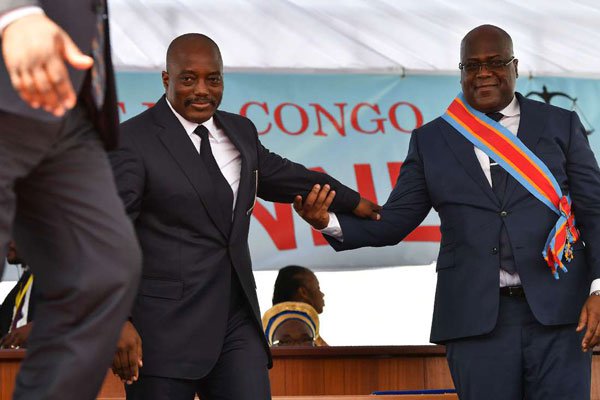By AFP
DR Congo’s recently elected president, Felix Tshisekedi and his predecessor Joseph Kabila on Wednesday said they had decided to form a coalition government following talks.
Despite Tshisekedi’s election—the first peaceful transition of power since the Democratic Republic of Congo gained independence from Belgium in 1960—the 55-year-old has found himself effectively having to share power since the presidential poll.
He has not been able to push through his choice for prime minister as Kabila’s Common Front for Congo (FCC) wields a huge majority in the National Assembly, for which elections were also held on December 30.
The stalemate has put a brake on Tshisekedi’s declared ambitions of reforming a country marked by corruption and rights abuses.
The FCC has 342 of the 485 seats while only around 50 are members of the CACH, the bloc representing Tshisekedi, whose late father Etienne spent 35 years in opposition and never reached the top.
‘Common will’
In a joint statement on Wednesday, Tshisekedi and Kabila said that although the “FCC holds an absolute majority in the National Assembly” to reflect the will of the people expressed in the poll, the FCC and the CACH are affirming “their common will to govern together as part of a coalition government”.
This path would aim to preserve the “achievements of the historic peaceful transfer of power that took place on January 24, 2019, to strengthen the climate of peace and stability of the country… and facilitate the rapid establishment of a government,” it added.
The statement follows a visit to Namibia last week when Tshisekedi vented his frustration at being unable to assemble a majority to back his choice for prime minister.
“The president that I am will not accept being a president who reigns but doesn’t govern,” he said.
Rigging
Meanwhile Wednesday, presidential runner-up Martin Fayulu said he would refuse to take his seat as an MP, describing the role as inappropriate for someone who considered himself to be the country’s “elected president.”
Fayulu claims the December 30 elections were rigged.
He was credited with 34.8 percent of the vote against 38.5 percent for Tshisekedi.
“I was elected president of the republic—I cannot fall back on being an MP, never!” he told AFP.
“I am the elected president, and this is what I consider myself to be. I cannot be both the elected president and an MP,” he said.
An aide to Fayulu confirmed that the MP had written to the administration of the National Assembly to say “he will not take his seat as a member for the city of Kinshasa.”
Fayulu says the outcome of the election was a stitch-up by Tshisekedi and Kabila, who was stepping down after 18 years in power.
He maintains he picked up around 60 percent of the vote. His claims of flaws have been boosted by the powerful Catholic church, which deployed 40,000 election observers, and the European Union.




